PLAY THERAPY
The Healing Play
Where emotions find their voice in the language of play.

The Healing Play
In the world of Play Therapy, every game has a deeper meaning.
Giving children the tools to express the inexpressible. Through play, we find pathways to understanding and growth.

FAQ
Questions?
Play therapy is a form of psychotherapy or counselling that is specifically designed for children, typically between the ages of 3 and 12, although it can also be used with older individuals who have developmental challenges. It recognizes that play is a natural way for children to communicate and process their feelings, thoughts, and experiences.
The premise of play therapy is that children may not have the verbal or cognitive skills to express their thoughts, feelings, and experiences directly through traditional talk therapy. Instead, they use play as a natural way to communicate and make sense of their emotions, thoughts, and struggles. Play therapists create a safe and supportive environment where children can engage in various forms of play, such as using toys, art materials, games, and other creative activities.
During play therapy sessions, trained play therapists observe the child's play behaviors, interactions with the toys, and the themes that emerge. Through this observation, therapists gain insights into the child's emotional and psychological state, helping them understand the underlying issues the child may be facing. Play therapists may then provide guidance, reflect on the child's play, and help the child process their emotions and experiences.

Play therapy offers a range of benefits for children and even adults, depending on the individual's needs and circumstances. Some of the key benefits of play therapy include:
Play provides a safe and non-threatening way for children to express their emotions, feelings, and experiences that may be difficult to articulate verbally. This can lead to better emotional regulation and understanding.
Through play, children can develop and enhance their communication skills, both verbal and nonverbal. This can improve their ability to express themselves and interact with others effectively.
Play therapy encourages children to engage in imaginative and creative play scenarios, which can help them develop problem-solving skills, critical thinking, and the ability to explore different solutions to challenges.
Children can learn healthy coping mechanisms and strategies to manage stress, anxiety, and other emotional difficulties through play therapy. They can practice these skills in a supportive environment.
Play therapy often involves interaction with the therapist or with other children in group sessions. This can help children develop social skills, such as sharing, taking turns, cooperation, and empathy.
Successful experiences and achievements during play therapy sessions can boost a child's self-esteem and confidence. The supportive atmosphere encourages them to take risks and try new things.
Play therapy can help children process and cope with traumatic experiences in a safe and controlled environment. Trauma-related play can facilitate healing and recovery.
Play therapy can address behavioral issues by allowing children to explore and understand the underlying causes of their behaviors. This understanding can lead to positive behavior changes.
The therapeutic relationship that develops between the child and the therapist in play therapy can foster a sense of attachment, trust, and security. This can be particularly helpful for children who have experienced disruptions in their relationships.
Engaging in play therapy can enhance a child's emotional resilience, helping them develop the ability to adapt and bounce back from challenges.
Play therapy can involve parents or caregivers in the process, helping them better understand their child's experiences, needs, and behaviors. This can lead to improved parent-child relationships and more effective parenting strategies.
Play therapy encourages creativity and imaginative play, which can enhance a child's cognitive development and overall sense of exploration.
In play therapy, children can take charge of the play activities and create their narratives. This sense of control can empower them and provide a sense of agency.
It's important to note that the benefits of play therapy can vary based on the individual's age, developmental stage, personality, and the specific challenges they are facing. Play therapy should be conducted by qualified and trained professionals who can tailor the approach to meet the unique needs of each child or individual.

Play therapy is primarily used for children, typically between the ages of 3 and 12. It is especially beneficial for children who may have difficulty expressing themselves verbally or who are facing emotional, behavioral, or psychological challenges. Play therapy can be used with children from diverse backgrounds and with various issues, including but not limited to:
Children struggling with anxiety, depression, anger, grief, or other emotional difficulties can benefit from play therapy to help them process and manage their feelings.
Play therapy can address behavioral problems such as aggression, impulsivity, defiance, and social difficulties by helping children develop coping skills and alternative behaviors.
Children who have experienced traumatic events or abuse can use play therapy to process their experiences, build resilience, and work towards healing.
Play therapy can assist children in adjusting to changes in their family structure, such as divorce, separation, or the arrival of a new sibling.
Children with developmental disorders such as autism spectrum disorder (ASD) or attention-deficit/hyperactivity disorder (ADHD) can benefit from play therapy to improve social skills, communication, and emotional regulation.
Play therapy can help children navigate academic stress, peer interactions, and school-related anxieties.
Children who have experienced disruptions in their early attachments or have difficulties forming secure relationships may find play therapy helpful in building trust and connections.
Play therapy can provide a platform for children to confront and manage their fears and phobias.
Children dealing with chronic illnesses, medical procedures, or hospitalization can use play therapy to cope with their experiences and express their emotions.
Children who struggle with making friends, interacting with peers, or understanding social cues can benefit from play therapy to enhance their social skills.
Play therapy can boost a child's self-esteem and confidence, helping them develop a positive self-image.
Play therapy can teach children healthier ways to express and manage their anger.
While play therapy is most commonly associated with children, it can also be adapted for adolescents and even adults who have developmental challenges or who find play and creative expression to be effective modes of communication and healing. Additionally, play therapy can involve parents or caregivers to enhance parent-child relationships and support the child's progress.
It's important to note that play therapy should be administered by licensed and trained mental health professionals who have expertise in this specific therapeutic approach.

The number of play therapy sessions required can vary widely based on several factors, including the individual child's or client's needs, the nature of the issues being addressed, the progress made, the therapist's approach, and the specific goals of therapy. There is no fixed number of sessions that applies to everyone, as each person's therapeutic journey is unique.
Typically, play therapy requires minimum 12 sessions to achieve meaningful results. Some children or individuals may experience noticeable improvements within a few sessions, while others may require longer-term therapy to address complex or deep-seated issues.
Here are a few considerations that can influence the number of play therapy sessions:
- Nature and Severity of Issues:
The complexity and severity of the issues being addressed will impact the duration of therapy. Mild challenges may be resolved more quickly than deeply rooted issues. - Goals of Therapy:
The specific goals established at the beginning of therapy will guide the treatment process. Short-term goals may be met relatively quickly, while long-term goals could take more time. - Client's Progress:
Regular assessments of the client's progress and feedback from both the client and their caregivers can help the therapist gauge how well the therapy is working and whether adjustments are needed. - Client's Readiness:
Some clients may need more time to build trust and establish a therapeutic relationship before delving into deeper issues. - Consistency and Frequency:
The frequency of sessions (1 session per week) and the consistency of attendance can influence the pace of progress. - Child's Age and Developmental Stage:
Younger children or those with developmental challenges may require more time for therapy due to their cognitive and emotional development. - Parent/Caregiver Involvement:
If parents or caregivers are actively involved in the therapy process, the collaboration can influence the effectiveness and duration of therapy. - Crisis Situations:
In some cases, play therapy might be used to address acute or crisis situations, which could lead to a shorter duration of therapy.
Ultimately, the number of play therapy sessions required is unique to each individual, and decisions about the duration of therapy should be made collaboratively between the therapist and the client (or their parents/caregivers) based on the client's progress and evolving needs.
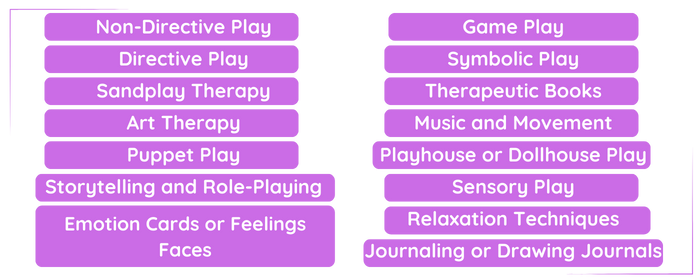
Play therapy involves a variety of techniques and approaches that are tailored to the individual needs and goals of the child or client. These techniques are designed to facilitate communication, expression, and healing through play. Here are some common techniques used in play therapy:
- Non-Directive Play:
Also known as child-centered play therapy, this approach allows the child to lead the play session. The therapist provides a range of toys and materials and allows the child to choose how to engage with them. This technique encourages self-expression and autonomy. - Directive Play:
In this approach, the therapist guides the play session by suggesting specific activities or themes. This can be useful for addressing particular issues or helping the child explore certain emotions. - Sandplay Therapy:
The child creates scenes using miniature figurines and a tray of sand. This technique allows for symbolic representation of feelings and experiences that may be difficult to express verbally. - Art Therapy:
Using various art materials, the child can create drawings, paintings, sculptures, or other forms of art to express themselves. Art therapy can help with emotional expression and exploration. - Puppet Play:
Puppets can be used to act out scenarios or feelings, allowing the child to express themselves indirectly through the puppets. - Storytelling and Role-Playing:
Through storytelling or role-playing, the child can explore different perspectives, scenarios, and emotions, which can provide insights into their thoughts and feelings. - Game Play:
Board games, card games, and interactive games can be used to facilitate communication, cooperation, and problem-solving. Games can also be adapted to address specific issues. - Symbolic Play:
This involves the use of objects and symbols to represent feelings or experiences. For example, a child might use a stuffed animal to represent a certain emotion. - Therapeutic Books:
Reading and discussing age-appropriate books with relevant themes can help the child explore their feelings and gain insight into their experiences. - Music and Movement:
Incorporating music, dance, and movement can provide a creative outlet for emotional expression and regulation. - Playhouse or Dollhouse Play:
Using miniature houses and figures, the child can create scenarios and narratives, which can offer insights into their perceptions of family dynamics or other life situations. - Sensory Play:
Engaging in sensory activities, such as playing with sand, water, or clay, can help children process emotions and sensory experiences. - Relaxation Techniques:
Techniques like deep breathing, visualization, or mindfulness can be integrated into play therapy to help children manage stress and anxiety. - Emotion Cards or Feelings Faces:
Using visual aids like emotion cards or pictures of faces with different expressions can help children identify and express their feelings. - Journaling or Drawing Journals:
Older children may benefit from journaling or drawing to express their thoughts and emotions.
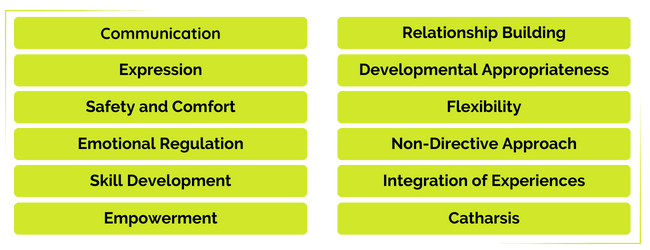
Play is used in therapy for several important reasons:
- Communication:
Children may not have the vocabulary or cognitive abilities to express their thoughts, emotions, and experiences verbally. Play provides them with a natural and comfortable way to communicate and express themselves. - Expression:
Through play, children can symbolically represent their inner thoughts, feelings, and conflicts. They can create scenarios and narratives that mirror their real-life situations, allowing therapists to gain insights into their inner world. - Safety and Comfort:
Play therapy creates a safe and non-threatening environment for children. They often feel more at ease using play materials to convey their feelings, which can lead to greater openness and a willingness to explore difficult topics. - Emotional Regulation:
Play allows children to process and regulate their emotions. Engaging in creative activities can help them release pent-up feelings and cope with emotional challenges. - Catharsis:
Play can provide a cathartic outlet for children to work through their struggles, fears, and traumas in a controlled and supportive setting. - Skill Development:
Play therapy can help children develop and practice important life skills, such as problem-solving, social interaction, communication, and coping strategies. - Empowerment:
Through play, children can take on various roles and situations, giving them a sense of control and mastery over their experiences. - Relationship Building:
Play therapy sessions provide an opportunity for the child and therapist to build a strong therapeutic relationship. This bond can foster trust, which is essential for effective therapy. - Developmental Appropriateness:
Play is developmentally appropriate for children, as it aligns with their natural inclinations and stages of cognitive and emotional development. - Flexibility:
Play therapy can be adapted to suit the individual needs and preferences of each child. Therapists can tailor activities to address specific issues the child is facing. - Non-Directive Approach:
Play therapy often follows a non-directive approach, allowing children to lead the play session. This approach respects the child's autonomy and encourages them to explore at their own pace. - Integration of Experiences:
Play can help children integrate and make sense of their experiences, particularly those that might be confusing or overwhelming.
Overall, play therapy recognizes that children have unique ways of processing and responding to their emotions and challenges. By harnessing the power of play, therapists can create a therapeutic space where children can heal, grow, and develop in a supportive and nurturing environment.

"Play" and "play therapy" are related concepts, but they have distinct purposes and contexts. Here's how they differ:
Play: Play refers to a natural and spontaneous activity that children engage in for fun, exploration, and learning. Play can take various forms, such as imaginative play, physical play, creative play, and social play. It is an essential aspect of childhood development and contributes to cognitive, emotional, social, and physical growth.
Children engage in play to:
- Explore their environment and develop a better understanding of the world.
- Express their thoughts, emotions, and experiences.
- Develop motor skills, coordination, and cognitive abilities.
- Interact and communicate with others.
- Build social skills, cooperation, and empathy.
- Experiment with roles, scenarios, and problem-solving.
Play is a fundamental and integral part of a child's development and contributes to their overall well-being.
Play Therapy: Play therapy is a therapeutic approach that uses play as a medium to help children (and sometimes adults) address and resolve emotional, behavioral, and psychological challenges. It involves the guidance of a trained play therapist who uses play-based activities, toys, and creative materials to facilitate communication, expression, and healing.
In play therapy:
- Play becomes a structured and intentional therapeutic tool.
- The focus is on addressing specific issues, such as trauma, anxiety, depression, family conflicts, etc.
- The therapist creates a safe and supportive environment where the child can express themselves and work through their challenges.
- The therapist observes the child's play behaviors, themes, and interactions to gain insights into their inner world.
- The therapist may use various play therapy techniques and interventions to facilitate healing, personal growth, and emotional regulation.
While play in general is a natural activity that all children engage in, play therapy is a specialized form of therapy conducted by trained professionals. Play therapy is designed to address specific therapeutic goals and is applied within a therapeutic context to promote emotional and psychological well-being.
In summary, play is a universal childhood activity with developmental benefits, while play therapy is a therapeutic approach that harnesses the power of play to help individuals work through emotional and psychological challenges in a guided and therapeutic manner.
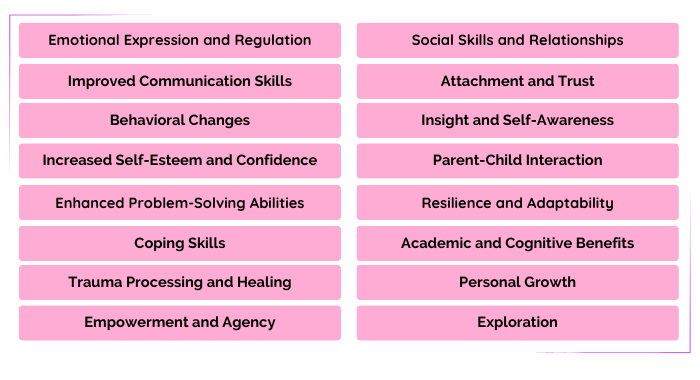
In play therapy, there are several positive outcomes and results that can be achieved through the therapeutic process. While individual experiences may vary, here are a few common results that can emerge from play therapy:
- Emotional Expression and Regulation:
Play therapy provides a safe outlet for children to express and process their emotions. As a result, children may become better equipped to identify, understand, and manage their feelings. - Improved Communication Skills:
Children often develop enhanced verbal and nonverbal communication skills as they learn to express themselves through play and interactions with the therapist. - Behavioral Changes:
Play therapy can lead to positive changes in behavior. Children may learn new coping strategies and alternative behaviors to replace negative or problematic patterns. - Increased Self-Esteem and Confidence:
Successful experiences and achievements during play therapy sessions can boost a child's self-esteem and confidence. - Enhanced Problem-Solving Abilities:
Engaging in imaginative and creative play scenarios can improve a child's ability to think critically, solve problems, and explore different solutions. - Coping Skills:
Children may acquire healthier coping mechanisms for dealing with stress, anxiety, and challenges in their lives. - Trauma Processing and Healing:
Play therapy can help children process and heal from traumatic experiences, allowing them to better understand and integrate their feelings about the trauma. - Empowerment and Agency:
The freedom to choose and direct play activities can empower children, helping them develop a sense of control and agency over their experiences. - Social Skills and Relationships:
Through play therapy, children can improve their social skills, such as sharing, taking turns, cooperation, and empathy. This can extend to improved relationships with peers and family members. - Attachment and Trust:
A strong therapeutic relationship can develop between the child and the therapist, leading to improved attachment, trust, and a sense of security. - Insight and Self-Awareness:
Children may gain insight into their thoughts, feelings, and behaviors, leading to greater self-awareness and self-understanding. - Parent-Child Interaction:
Play therapy can improve parent-child relationships, as parents learn more about their child's experiences and needs, leading to more effective communication and parenting strategies. - Resilience and Adaptability:
Engaging in play therapy can enhance a child's emotional resilience, helping them develop the ability to adapt and bounce back from challenges. - Academic and Cognitive Benefits:
Play therapy that involves cognitive activities can support a child's cognitive development, creativity, and problem-solving skills, which can potentially translate into improved academic performance. - Personal Growth and Exploration:
Play therapy encourages personal growth, exploration of new ideas, and a deeper understanding of oneself.
It's important to note that play therapy results can take time to manifest, and the specific outcomes will depend on the individual child's needs, goals, and progress. Additionally, the involvement of parents or caregivers in the therapy process can influence and amplify these results. Play therapy is a dynamic and responsive process that is tailored to each child's unique circumstances.
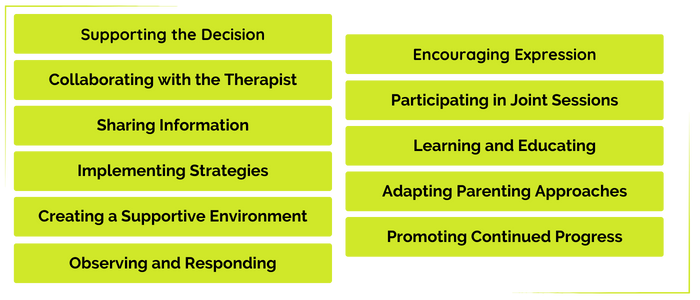
Parents play a significant and important role in the play therapy process. Their involvement can greatly enhance the effectiveness of play therapy and support the child's overall progress. Here are some key roles that parents can play in the play therapy journey:
- Supporting the Decision:
Parents are usually the ones who decide to enroll their child in play therapy. Their support and commitment to the process are essential for its success. - Collaborating with the Therapist:
Parents and the play therapist work together as a team to address the child's challenges. The therapist may meet with parents to gather information, set goals, and provide updates on the child's progress. - Sharing Information:
Parents provide valuable insights into the child's history, behavior, and experiences. They can share information about family dynamics, recent events, and any concerns they have about the child's well-being. - Implementing Strategies:
The play therapist may offer suggestions and strategies for parents to use at home to reinforce the child's progress. Parents can implement these techniques to support the child's emotional regulation, coping skills, and behavior. - Creating a Supportive Environment:
Parents can create a nurturing and supportive home environment that complements the therapeutic work being done in sessions. This includes providing opportunities for creative play, communication, and emotional expression. - Observing and Responding:
Parents can observe changes in the child's behavior, emotions, and interactions at home. They can then communicate these observations to the play therapist, which helps guide the therapy process. - Encouraging Expression:
Parents can encourage open communication with the child about their experiences in play therapy. This creates a safe space for the child to share their thoughts and feelings. - Participating in Joint Sessions:
In some cases, the play therapist may invite parents to participate in joint sessions. These sessions can help parents better understand their child's therapeutic process and provide opportunities for healing and growth within the family dynamic. - Learning and Educating:
Parents can take the initiative to learn about play therapy concepts and techniques. This empowers them to support the child's progress and implement therapeutic strategies at home. - Adapting Parenting Approaches:
Based on the guidance of the play therapist, parents can adapt their parenting approaches to better meet the child's emotional and developmental needs. - Promoting Continued Progress:
Play therapy sessions are just one part of the overall therapeutic journey. Parents can encourage the child's ongoing progress by continuing to foster a supportive and communicative home environment.
It's important to note that each child and family is unique, and the extent of parent involvement in play therapy may vary based on the child's age, developmental stage, and the specific therapeutic goals. A skilled play therapist will work collaboratively with parents to create a customized plan that best supports the child's emotional and psychological well-being.
International
Certifications

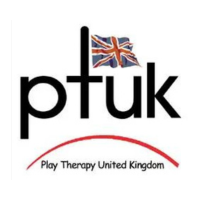
Latest
Watch Video
Contact Us
+91 91577 42933
Tel: +91 91577 42933
Email: thehealingplay@gmail.com
Reach us
A402 Antarnad Foundation, Shikhar Complex, Next to adani office, Mithakhali crossroads, Ahmedabad
Opening Hours
9.00 AM - 06.30 PM
Off